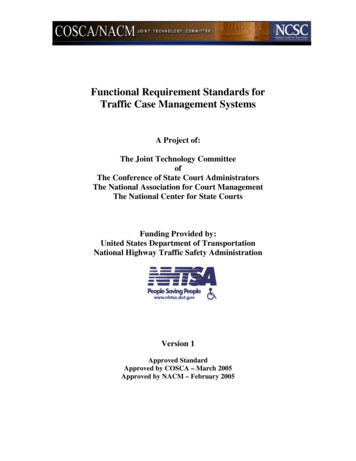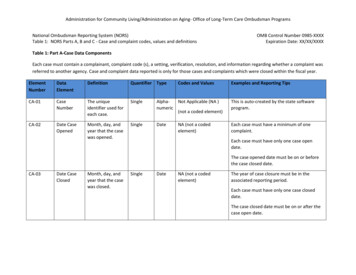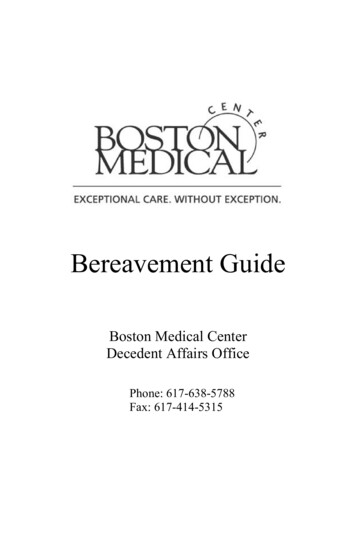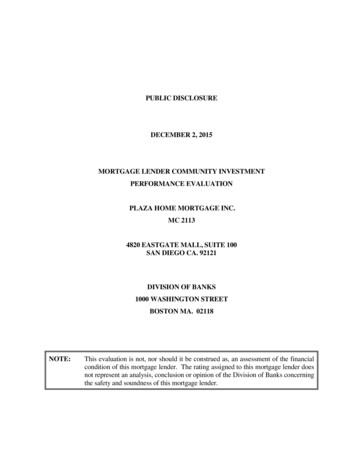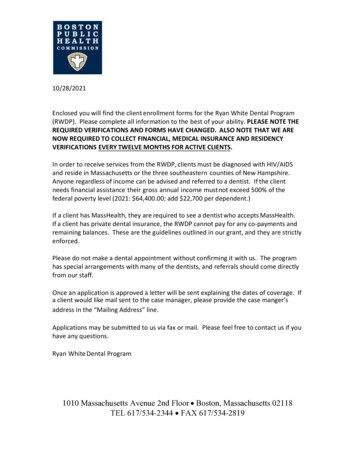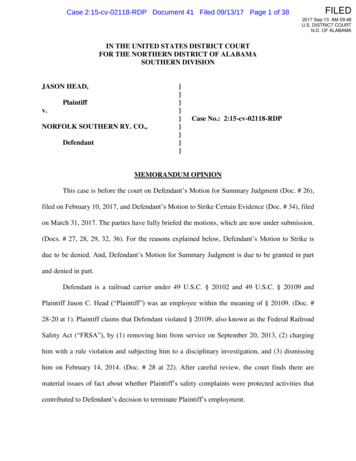
Transcription
FILEDCase 2:15-cv-02118-RDP Document 41 Filed 09/13/17 Page 1 of 382017 Sep-13 AM 09:48U.S. DISTRICT COURTN.D. OF ALABAMAIN THE UNITED STATES DISTRICT COURTFOR THE NORTHERN DISTRICT OF ALABAMASOUTHERN DIVISIONJASON HEAD,Plaintiffv.NORFOLK SOUTHERN RY. CO.,Defendant}}}}}}}}}Case No.: 2:15-cv-02118-RDPMEMORANDUM OPINIONThis case is before the court on Defendant’s Motion for Summary Judgment (Doc. # 26),filed on February 10, 2017, and Defendant’s Motion to Strike Certain Evidence (Doc. # 34), filedon March 31, 2017. The parties have fully briefed the motions, which are now under submission.(Docs. # 27, 28, 29, 32, 36). For the reasons explained below, Defendant’s Motion to Strike isdue to be denied. And, Defendant’s Motion for Summary Judgment is due to be granted in partand denied in part.Defendant is a railroad carrier under 49 U.S.C. § 20102 and 49 U.S.C. § 20109 andPlaintiff Jason C. Head (“Plaintiff”) was an employee within the meaning of § 20109. (Doc. #28-20 at 1). Plaintiff claims that Defendant violated § 20109, also known as the Federal RailroadSafety Act (“FRSA”), by (1) removing him from service on September 20, 2013, (2) charginghim with a rule violation and subjecting him to a disciplinary investigation, and (3) dismissinghim on February 14, 2014. (Doc. # 28 at 22). After careful review, the court finds there arematerial issues of fact about whether Plaintiff’s safety complaints were protected activities thatcontributed to Defendant’s decision to terminate Plaintiff’s employment.
Case 2:15-cv-02118-RDP Document 41 Filed 09/13/17 Page 2 of 38I.Statement of FactsThe facts set out in this opinion are gleaned from the parties’ submissions and the court’sown examination of the evidentiary record. All reasonable doubts about the facts have beenresolved in favor of the nonmoving party. See Info Sys. & Networks Corp. v. City of Atlanta, 281F.3d 1220, 1224 (11th Cir. 2002). These are the “facts” for summary judgment purposes only.They may not be the actual facts that could be established through live testimony at trial. See Coxv. Adm’r U.S. Steel & Carnegie Pension Fund, 17 F.3d 1386, 1400 (11th Cir. 1994).A.Plaintiff’s Employment HistoryPlaintiff was employed by Defendant as a carman from 1998 until February 14, 2014.(Doc. # 32-2 at 1). At the times relevant to this case, Plaintiff worked as a gang leader on thethird shift at Norris Yard near Birmingham, Alabama. (Doc. # 28-1 at 102-03, 161-62, 227-28).The gang leader is part of a crew of carmen, but is paid extra to arrive early and stay late duringshifts in order to complete daily train yard reports of the crew’s car inspections. (Docs. # 28-21at 24; 28-26 at 4). As members of Defendant’s Mechanical Department, carmen regularly inspectrailcars on outgoing trains, perform light repairs on cars, and test the air brakes on the trains.(Docs. # 28-1 at 137-38; 28-14 at 1; 28-26 at 2-3). If, during the course of the inspection, acarman deems a railcar to be unsafe, the car receives a “bad-order tag” and is sent to the repairshop. (Doc. # 28-1 at 12).Norris Yard has two main yards, the East Yard and the West Yard. (Doc. # 28-26 at 3).More trains depart from the West Yard, and it is longer than the East Yard. (Docs. # 28-26 at 3;28-28 at 12-13). In September 2013, the Mechanical Department at Norris Yard had six Kubota2
Case 2:15-cv-02118-RDP Document 41 Filed 09/13/17 Page 3 of 38ATVs1 and Chevrolet trucks at its disposal for travelling between the diesel shop, car shop, andinspection yards. (Doc. # 28-26 at 2). Typically, at that time, the West Yard crew used twoChevrolet trucks, while the East Yard crew used two Kubotas. (Doc. # 28-1 at 99). Carmen whoworked in the West Yard traveled along “the main thoroughfare” with 18-wheelers and dumptrucks. (Id. at 82-83).During Plaintiff’s tenure at Norfolk Southern, but at least several years2 before aSeptember 2013 disciplinary action that is at issue in this case (and discussed in detail below),Plaintiff came to believe that Norfolk Southern’s management was responding to an increase inFederal Railway Administration (“FRA”) inspections at the Norris Yard by discouraging carmenfrom taking mechanically defective cars out of service. (Id. at 46-47). Plaintiff has testified thatseveral managers at the Norris Yard, including (1) Steve Collier, a general foreman, (2) TomBartley, a former superintendent at Norris Yard, (3) Tim Spence, Bill Swanson, and G.G. Jones,mechanical supervisors, (4) David Walker, a senior general foreman, and (5) Ed Mickens, adivision manager, discouraged employees from bad-ordering cars.3 (Id. at 29-56). Plaintiffrecalled that Swanson “made it appear[ ] that [he] had fraudulently bad[-]ordered a car” becauseCollier and Swanson made him explain why he reported a car for droplets of hydraulic fluid thatwere present at the time of Plaintiff’s inspection. (Id. at 37-41). Although the hydraulic fluid had1An all-terrain vehicle, or “ATV,” is “any motorized, off-highway vehicle designed to travel on 3 or 4wheels, having a seat designed to be straddled by the operator and handlebars for steering control.” 15 U.S.C. §2089(e)(1)(A).2During his deposition, Plaintiff could not recall when the supervisors discouraged him from bad-orderingrail cars. (See Doc. # 28-1 at 30-31, 42, 44, 49, 52). Plaintiff testified, though, that an incident with Bill Swansonoccurred well before Plaintiff’s leave of absence from Norfolk Southern in 2011. (Id. at 42). And, he asserted thatDavid Walker discouraged him from bad-ordering cars “well before” his leave of absence. (Id. at 45). Finally,Plaintiff recalled that G.G. Jones questioned some of his bad-order tags years before his leave of absence. (Id. at 5253).3Another unnamed supervisor told the carmen “to keep the bad orders low.” (Id. at 60-61).3
Case 2:15-cv-02118-RDP Document 41 Filed 09/13/17 Page 4 of 38been “wiped away from the truck side frame,” Plaintiff found more hydraulic fluid underneaththe frame. (Id. at 38). Moreover, Collier threatened to “abolish [Plaintiff’s] job” by changing hisschedule so that he could not work as a carman and attend school. (Id. at 63-64).In 2004, Plaintiff filed a complaint with the FRA. (Id. at 11, 13). In the FRA complaint,Plaintiff alleged that Collier had illegally removed the bad-order tags for four railroad cars andhad sent them on to further destinations without performing necessary repairs.4 (Id. at 12-16).According to Plaintiff, Ferrell Arms, a FRA agent, told him that the cars were in fact defectiveand should have been bad-ordered.5 (Id. at 14). Collier was not interviewed by the FRA ordisciplined for an FRA violation after the cars were sent on without repair. (Doc. # 28-14 at 2;see also Doc. # 28-1 at 16-17 (Plaintiff testifying that he did not know whether Collier wasdisciplined for the incident)). Following his FRA complaint, John Manning, another carman, toldPlaintiff that he heard management state that they were “out to get” him. (Doc. # 28-1 at 254-55).Manning informed Plaintiff that he had been questioned about the bad-ordered railcar withleaking hydraulic fluid because of management’s feelings towards him. (Id.). Eric Churilla, asupervisor, told Plaintiff not to bad-order any more cars because they were “looking for” him.6(Doc. # 28-1 at 255).In 2004, Norfolk Southern disciplined Plaintiff for sleeping in a company vehicle whileon duty. (Doc. # 28-11 at 2). He received a deferred 15-day suspension for the offense. (Id.). In4Running bad-ordered cars is an FRA violation, unless the cars are being moved for repair purposes. Seegenerally 49 C.F.R. § 215.9.5In contrast, Collier has recounted that another carman and he appropriately removed the bad-order tagsbecause the air brakes on the railcars were in good working order. (Doc. # 28-14 at 2). Given that this case is at theRule 56 stage, the court accepts Plaintiff’s averment that Arms informed him of an FRA violation concerning therailcars.6Defendant did not raise any hearsay objection to this statement in its Motion to Strike. (See generallyDoc. # 34).4
Case 2:15-cv-02118-RDP Document 41 Filed 09/13/17 Page 5 of 38November 2010, Norfolk Southern disciplined Plaintiff for excessive speeding and carelessdriving. (Id.). Plaintiff received a five-day deferred suspension for that offense. (Id.). In August2011, Norfolk Southern disciplined Plaintiff for hanging an end-of-train device on a train“without blue flag protection.”7 (Id.). Plaintiff received a deferred 30-day suspension for thatviolation. (Id.). Then, in November 2011, Plaintiff disciplined Plaintiff again for failing todisplay a blue flag. (Id.). Plaintiff received a five-day suspension for that offense, and NorfolkSouthern also activated the previously deferred 30-day suspension. (Id.). In December 2011,Plaintiff left his position under a leave of absence after breaking the scaphold bone in his lefthand. (Id. at 1; Doc. # 28-1 at 77). He returned to work in June 2013. (Doc. # 28-11 at 1).B.Plaintiff’s Use of the “Unsafe” Kubota ATVIn September 2013, one of the trucks in the West Yard was taken out of service due tofront axle damage. (Doc. # 28-1 at 277). From September 12, 2013 until September 18, 2013, theWest Yard crew used a Kubota ATV while their truck was in the repair shop. (Id. at 95-96, 103).Plaintiff drove the ATV assigned to the West Yard crew during that week. (Id. at 95). AlthoughPlaintiff “complained about the Kubota from the beginning,” his complaints were not alwaysrelated to the vehicle’s safety. (Id. at 96-97). Plaintiff’s first grievance to Mike Weaver, asupervisor, concerned only the fact that that he had to drive the Kubota. (Id.). Plaintiff hastestified that he did not complain about the Kubota’s safety during his initial complaints toWeaver because he “was just gaining experience with the Kubota at that point.” (Id. at 96).Weaver allowed the West Yard crew to use his supervisor’s truck until the other truck wasrepaired, but Plaintiff continued to use the ATV, while other members of the West Yard teamused Weaver’s truck. (Id. at 186-187). Plaintiff did not complain about the assignment of the7Carmen use a blue flag or blue light while inspecting trains to warn others that the track is blocked. (SeeDoc. # 28-1 at 145).5
Case 2:15-cv-02118-RDP Document 41 Filed 09/13/17 Page 6 of 38ATV on the daily reports he submitted for September 12, September 15, September 16, orSeptember 17. (See Doc. # 28-27 at 1, 4-6).On September 18, 2013, Plaintiff worked as the gang leader of the five-person third shiftcrew in the West Yard. (Doc. # 28-1 at 103). The Third Shift started working at 11 p.m. the nightof the 18th and ended work at 7 a.m. the morning of September 19th. (Id. at 103, 105; Doc. # 2821 at 19). Around that time, the West Yard’s truck was returned from the repair shop. (Doc. #28-1 at 96). Upon the vehicle’s return, Collier and Jeff Freeman, a mechanical supervisor,decided to assign the repaired truck to the East Yard crew instead of the West Yard crew. (Docs.# 28-21 at 13-14; 28-26 at 4; 28-28 at 22-23). Freeland has explained that they reassigned thetruck “to protect [their] operation” because West Yard crews -- on all three shifts -- had damagedseveral vehicles.8 (Doc. # 28-21 at 14). However, Plaintiff has testified that the East Yard crewdid not use the truck at all because one of the bridges in the East Yard was too narrow for atruck. (Doc. # 28-1 at 271-74). Although Norfolk Southern’s paperwork stated that the truck wasassigned to the West Yard, it remained parked in the East Yard. (Id. at 273-74).Plaintiff has recounted that the Kubota ATV presented several safety issues. First, heobserved that the Kubota used by the West Yard crew had an inadequate windshield and thedriver could not see through it. (Id. at 81). Second, he believed that the ATV was unsafe becauseworkers had to drive it on the same road with 18-wheelers and dump trucks. (Id. at 82-84).Plaintiff complained about this issue at some point before September 18, 2013. (Id. at 84). Third,he also complained that the ATV had a governor on its engine. (Id. at 85). Plaintiff explained thatthe governor created problems because the ATV backed up traffic on the road in the West Yard.(Id. at 85-86). Finally, Plaintiff asserted that the ATV could not handle the rough roads in the8In contrast, Ryan McLain has averred that Freeman and Collier reassigned the truck so that each yardcrew would have a truck and an ATV to use. (Doc. # 28-26 at 4-5).6
Case 2:15-cv-02118-RDP Document 41 Filed 09/13/17 Page 7 of 38West Yard. (Id. at 88-89). He contends that a driver could not reduce the effect of the roughroads through throttle control because the power would suddenly increase as the driver appliedmore throttle. (Id. at 89-91).C.Plaintiff’s Complaints About the Kubota ATVAt 6:44 a.m. on September 19, 2013, Plaintiff contacted Freeman and asked him whenthe truck would be returned to the West Yard. (Doc. # 28-21 at 24-26). Freeman told him “thetruck wasn’t coming back out there” and refused to discuss the issue further because a train hadderailed in Norris Yard. (Docs. # 28-1 at 208-10; 28-21 at 24-26). Plaintiff told Freeman that he“wanted to come and see him” because Plaintiff was “soaked” after driving the ATV for theshift. (Doc. # 28-21 at 26).At 7:10 a.m., Plaintiff complained to Mariola Green, a clerk who worked in NorrisYard’s locomotive shop, that Freeman was an “asshole” and a “motherfucker” for assigning theATV to the West Yard because “riding in the [open-air] Kubota wasn’t good” for his health.(Docs. # 28-5 at 22-23; 28-22 at 6, 9-10). Plaintiff attempted to call Freeman again to arrange ameeting but did not reach him. (Doc. # 28-23). Green testified that Plaintiff appeared upset, butshe did not believe Plaintiff was dangerous. (Docs. # 28-5 at 23; 28-22 at 11). Green did notreport Plaintiff’s outburst as a threat, despite the fact that Norfolk Southern employees whoperceive serious threats are expected to report them immediately. (Docs. # 28-22 at 34; 28-25 at77). Indeed, Green conversed with Plaintiff about their daughters after the outburst. (Doc. # 2823). Green stated during her deposition that she was “used” to that type of language. (Doc. # 2822 at 10). And, Freeland admitted to using the word “motherfucker” and other curse words whileworking. (Doc. # 28-21 at 62-63).7
Case 2:15-cv-02118-RDP Document 41 Filed 09/13/17 Page 8 of 38Following his conversation with Green,9 Plaintiff stated to Chris Dodson, anothercarman, that Freeman had “an ass whipping coming.” (Docs. # 28-6 at [158]; 28-9). Dodsonwent to work with Freeman on the train derailment, but did not mention Plaintiff’s comment toFreeman while at the derailment site. (Doc. # 28-21 at 30). After the two men returned to theoffice, Dodson relayed Plaintiff’s comment to Freeland, who asked Dodson whether he wasserious. (Id. at 30-31). Although Dodson replied to the question by saying “that’s what he said,”he did not affirmatively answer whether or not he perceived the threat to be a serious one. (Id. at31-32). Freeman reported Plaintiff’s statement to Collier at approximately 1:00 p.m., afterCollier had arrived at Norris Yard. (Id. at 33-34).After his conversation with Dodson, Plaintiff prepared the daily safety and maintenancechecklist for his shift. (See Doc. # 28-1 at 176, 178). In the report, Plaintiff explained that thethird shift had to work on a train transferred to them by the second shift. (Doc. # 28-3). Plaintiffalso explained other delays that the third shift encountered on its assigned trains. (See id.). Then,he discussed the assignment of the ATV to the West Yard crew:Much time was lost [ ] due to Mech. Super. Jeff Freeland giving our yard truck tothe East Yard who doesn’t need it & historically hasn’t used it, & giving us aKubota to traverse the expansive perimeter of the West Yard @ a snail’s pace.Mech. Super. Freeland denies a policy of blanket punishment but the facts speakclearly. The Kubota is inappropriate for West Yard use. It exposes us to hazards& dangers not encountered in a yard truck given the extreme distances we arerequired to traverse in performance of our duties. Freeland took our truck &assigned us a Kubota due to truck damage done by a few.(Id.).10 Plaintiff delivered copies of the daily report to Ryan McLain, a division manager, andGreg Swany, a mechanical superintendent, at approximately 11:00 a.m. on September 19. (Doc.9Plaintiff has agreed with Dodson’s averment that their conversation occurred between 7:15 and 7:45 a.m.on September 19. (Docs. # 28-1 at 182; 28-9).10Kenneth Cooper, a local union chairman, has indicated that a consulting firm investigated management’suse of “collective punishment” and that he participated in the process. (Doc. # 32-3 at 3). According to Cooper, the8
Case 2:15-cv-02118-RDP Document 41 Filed 09/13/17 Page 9 of 38# 28-1 at 179-80). Plaintiff also sent copies of the daily report to a distribution list for themechanical department. (Id. at 189-90). McLain and Swany were not in their offices whenPlaintiff submitted the report to them. (Id. at 187-88).Plaintiff worked on the third shift at the West Yard during September 19 and 20, 2013.(Doc. # 32-2 at 3). At the beginning of his September 19 shift, Plaintiff contacted Ladel Miles, asupervisor, to again voice his concerns about the safety of the Kubota. (Doc. # 28-28 at 24-25).Specifically, Plaintiff complained about his ability to see through the ATV’s windshield. (Doc. #28-1 at 166). Miles met Plaintiff in the West Yard office and inspected the Kubota. (Docs. # 28-1at 166-67; 28-28 at 25). Miles also rode with Plaintiff in the ATV for a distance. (Doc. # 28-1 at168-70). Miles did not find that the Kubota was unsafe, but he nevertheless attempted to resolvePlaintiff’s complaints by cleaning the windshield. (See Doc. # 28-28 at 30-31). Plaintiff askedMiles whether the truck would be returned, but Miles replied that the allocation of vehicles “hadalready been made by [his] supervisors.” (Id. at 31).Plaintiff was not formally disciplined for his comments in the September 18 train report.But, on September 20, Plaintiff was counseled against using the daily report to raise complaintsbecause the report was “a record widely circulated within [Norfolk Southern].” (Doc. # 28-26 at8). Collier, Freeman, and Miles attended the counseling meeting. (Doc. # 28-1 at 118). Themanagers told Plaintiff that the daily report “was not a proper place to report safety violations.”(Id.). The managers also complained about Plaintiff’s management of the third shift and accusedthem of “goofing off.”11 (Id. at 152-53). Plaintiff was unfamiliar with any written grievanceconsulting firm “found that the Mechanical Department work environment in Birmingham was intimidating toemployees and that there were bad misuses of the discipline process by [Norfolk Southern] management.” (Id.).Cooper has stated that the use of collective punishment harmed employees’ morale and created “a less safe workenvironment” at Norris Yard. (Id.).11Plaintiff suggested during the deposition that the management complaints occurred while they werediscussing the bad-order tags placed on two railcars. (Doc. # 28-1 at 152). But, the record is unclear as to whether9
Case 2:15-cv-02118-RDP Document 41 Filed 09/13/17 Page 10 of 38procedure for safety issues. (Id. at 120-21). Plaintiff asked Collier, Freeman, and Miles why thetruck had been reassigned to the East Yard. (Id. at 127). When Miles summoned Plaintiff to themeeting, he told Plaintiff -- in response to a question -- that he did not need to bring a unionrepresentative. (Id. at 128). Nevertheless, Plaintiff brought a union representative, KennethCooper, to the meeting. (Id. at 128-29).D.The Norfolk Southern Disciplinary ProcessUnder the employee conduct rules in the Norfolk Southern Corporation Book of Safetyand General Conduct, “[e]mployees are to conduct themselves in a professional manner and notengage in behavior or display material that would be considered offensive or inappropriate.”(Doc. # 28-5 at 21). This includes the making of disparaging remarks. (Id.). According to DennisKerby, Norfolk Southern’s Assistant Vice President of Labor Relations, the level of appropriatedisciplinary action for inappropriate language depends on the circumstances.12 (Doc. # 28-24 at12-13). The Norfolk Southern disciplinary system is intentionally flexible to address “things thatcan be corrected” while also addressing “situations where maybe someone has shown that theyare incorrigible or can’t correct their activity.” (Id. at 16). Kerby testified that use of the words“asshole” and “motherfucker” could subject an employee to a range of discipline fromcounseling to a formal disciplinary hearing, depending primarily on the particulars of theemployee’s conduct and secondarily on the employee’s service record, history, and intent. (Id. at15-16). He explained that an employee could be terminated for using those expletives to refer toanother specific individual if (1) the employee “didn’t have the best record” and (2) theCollier, Freeman, or Miles made any negative comment about the bad-order tags issued by the third shift onSeptember 18.12Defendant utilizes a progressive discipline system. Low-level punishments are handled with the STARTprogram, which differentiates between “START minor” infractions and “START serious” infractions. More seriousdisciplinary infractions are handled through a formal disciplinary hearing initiated with a charge letter. (Doc. # 32-3at 5).10
Case 2:15-cv-02118-RDP Document 41 Filed 09/13/17 Page 11 of 38employee could not correct his or her behavior. (Id. at 16). Kerby understands a threat is “somekind of verbal statement or action that the other individual would perceive as intended to causesome kind of harm or injury or put him at some type of risk.” (Id. at 18).E.The Investigation, Plaintiff’s Dismissal, and Post-Dismissal ProceedingsOn September 20, 2013, McLain asked permission of Swany by email to removePlaintiff from service because of “conduct unbecoming [of] an employee.” (Doc. # 32-4 at 6364). McLain asked Kevin Krull, a Norfolk Southern division manager in Knoxville, Tennessee,to conduct the removal hearing. (Id. at 63). In his email to Krull, McLain labeled Plaintiff as“easily the worst guy we have when it comes to attitudes [sic].” (Id.). Despite McLain’s request,he never disciplined Plaintiff between June 2013 and September 2013.13 (Doc. # 28-25 at 3).Nor was McLain aware of any safety complaints made by Plaintiff until September 19, 2013.(Id.).At approximately 5:00 p.m. on September 20, Collier called Plaintiff and told him thatNorfolk Southern was taking him out of service pending a formal investigation. (Doc. # 28-1 at191-92). Collier told Plaintiff that he did not know the reason for the investigation. (Id. at 192).No one at Norfolk Southern questioned Plaintiff about his comments to Green or Dodson beforehe was removed from service. (Id. at 192, 216).On September 23, 2013, McLain charged Plaintiff with conduct unbecoming of anemployee for: (1) engaging in offensive and/or inappropriate behavior, in violation of NorfolkSouthern’s General Regulation GCR-1; and (2) making a threatening statement. (Doc. # 28-7 at1). McLain’s charge did not specify which regulation Plaintiff violated by making a threatening13McLain began working at the Norris Yard in June 2012, while Plaintiff was on a leave of absence. (Doc.# 28-26 at 3).11
Case 2:15-cv-02118-RDP Document 41 Filed 09/13/17 Page 12 of 38statement. (Id.). Norfolk Southern did not give Plaintiff the option of waiving a disciplinaryinvestigation. (Id.).In an email exchange occurring on September 24, 2013, McLain informed Krull thatPlaintiff’s union had indicated that they would produce two witnesses to rebut the chargesagainst Plaintiff. (Doc. # 32-4 at 65). McLain stated his belief that Norfolk Southern could “getaround” their testimony because he doubted that both witnesses were in the locomotive office“for the whole 30 minutes or so that [Plaintiff] was there.” (Id.). In response, Krull askedwhether a witness who had testified in an earlier investigation, Gulledge, would be testifying atPlaintiff’s hearing. (Id.). McLain replied, “No, unfortunately. The charged employee thinks he’ssmarter than Gulledge.” (Id.). The email exchange ended with Krull writing, “We shall see. I likea challenge.” (Id.). During his deposition, Krull explained that the earlier investigation describedin the email exchange had presented a challenge to Krull because Gulledge had provided detailedinformation for the employee’s case. (Doc. # 32-4 at 86). Krull recalled asking whether Gulledgewould be present because, as Krull put it, Gulledge was “an exemplary witness in my mind.” (Id.at 85). Despite Gulledge’s “exemplary” testimony, Krull did not find his testimony credible.(Id.).Krull presided over the disciplinary hearing held on January 16, 2014. (Doc. # 28-5 at 1).Plaintiff has acknowledged that no one directly referenced or discussed the FRA complaintinvestigated by Ferrell Arms during the termination proceedings. (Doc. # 28-1 at 253). Duringthe hearing, McLain introduced the September 19 daily report as an exhibit and read Plaintiff’sreport about the ATV to Krull. (Doc. # 28-5 at 13-17). McLain also recounted that he directedCollier “to counsel [Plaintiff] regarding the comments on his train yard sheet in that thatdocument is not the appropriate vehicle for [Plaintiff] to voice his opinion and that [Plaintiff]12
Case 2:15-cv-02118-RDP Document 41 Filed 09/13/17 Page 13 of 38should have sent a separate email with his concerns.” (Id. at 17). McLain explained that Plaintiffshould not have included the complaints about the ATV in the daily report because such reportswere “official Norfolk Southern documents.” (Id. at 27). And, he asserted that the ATVpresented no “additional hazard or danger” as compared to a truck. (Id. at 28). He admitted thathe had used profanity while working for the railroad, but he denied directing profanity towards aparticular individual. (Id.).Freeman also testified that he heard profanity used at the work site by supervisors andcarmen (id. at 75-76), but he similarly distinguished profanity from profanity “directed atsomebody, or about somebody.” (Id. at 76). Green affirmed that she had heard profanity used inthe office. (Doc. # 28-6 at 40). According to Green, supervisors had used profanities whendiscussing situations, but she could not recall whether they had directed profanities towardindividuals. (Id.). Plaintiff candidly confirmed that he used profanity during the conversationwith Green. (Id. at 70). He affirmed that he said “something close” to the statement reported byDodson. (Id. at 72-73).Following the hearing, Krull recommended to Norfolk Southern’s Labor RelationsDepartment that Plaintiff be terminated and the Department approved that recommendation.(Doc. # 1 at ¶ 73).14 On February 14, 2014, Krull informed Plaintiff of his termination in a letterdrafted by Labor Relations. (Id.). (See also Doc. # 32-4 at 73) (confirming that Krull sent theletter to Plaintiff).On February 19, 2014, Plaintiff filed a complaint with the regional director of theOccupational Safety and Health Administration (“OSHA”). (Doc. # 28-2). In his OSHAcomplaint, Plaintiff claimed that Norfolk Southern had discriminated against him in violation of14To be clear, Defendant has admitted these allegations in the complaint. Krull’s recommendation and theFebruary 14, 2014 termination letter are not in the Rule 56 record.13
Case 2:15-cv-02118-RDP Document 41 Filed 09/13/17 Page 14 of 38§ 20109. (Id. at 1). The complaint discussed Plaintiff’s history of “complaints about hazardousconditions and safety issues” and noted that Plaintiff had earlier refused to quit bad ordering cars,despite management’s removal of bad order tags. (Id.). It stated that Plaintiff had reported“safety issues” concerning the “inadequate and unduly hazardous Kubota vehicle” in theSeptember 18-19 daily report. (Id.). In response, the OSHA complaint asserted that managementharassed Plaintiff during the September 20 meeting to intimidate him. (Id. at 1-2). When theharassment failed, the complaint alleged that Norris Yard management took him out of serviceand terminated him. (Id. at 2).On August 5, 2014, following its investigation, OSHA issued a decision finding noreasonable cause to support the § 20109 complaint. (Doc. # 28-20). On August 14, 2014,Plaintiff objected to OSHA’s findings and requested a hearing before an Administrative LawJudge (“ALJ”). (Doc. # 1 at ¶ 87). On October 27, 2015, Plaintiff notified the ALJ of his intent tofile this lawsuit. (Id. at ¶ 88). On November 20, 2015, Plaintiff filed this suit.F.Norfolk Southern’s Discipline of Identified “Comparators”In their briefing, the parties have discussed three prior cases of profanity and threats inthe Alabama Division of Norfolk Southern. (See, e.g., Doc. # 28-26 at 9-10). In a 2009altercation, carman E.B. Roy physically threatened a student carman. (Id. at 9). Roy stated thathe would “knock [his] f--- white ass out” and “punch [him] in the f---ing mouth, bitch.” (Id.).McLain, who was then a general foreman in New Orleans, charged Roy with a violation ofGeneral Regulation GCR-1. (Id. at 9-10). Following a disciplinary hearing, Norfolk Southerndismissed Roy. (Id. at 10). Cooper, who represented Roy as a local chairman for the union shop,has distinguished Roy’s incident from Plaintiff’s incident because Roy’s incident was “much14
Case 2:15-cv-02118-RDP Document 41 Filed 09/13/17 Page 15 of 38more serious,” it was “much more dangerous,” and it presented “a racial component and racialslurs.” (Doc. # 32-3 at 5-6).In July 2013, carman A.D. Moore confronted General Foreman Collier and threatenedhim. (Doc. # 28-26 at 9). Collier told Moore that he would be removed from service forproviding a false reason for missing work. (Id.). Moore threatened to “
November 2010, Norfolk Southern disciplined Plaintiff for excessive speeding and careless driving. (Id.). Plaintiff received a five-day deferred suspension for that offense. (Id.). In August 2011, Norfolk Southern disciplined Plaintiff for hanging an end-of-train device on a train "without blue flag protection."7 (Id.). Plaintiff received a .


